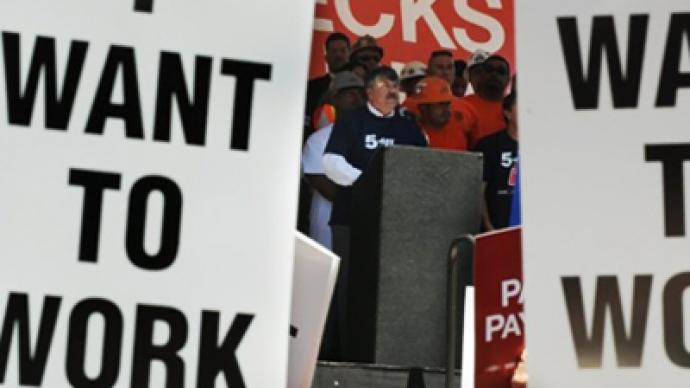Workers band together as unions are left behind

The AFL-CIO spent over $50 million worth of its members’ dues and deployed 250,000 workers to support Obama's campaign. But three years later, workers say unions have failed to deliver on their promises and are struggling to defend their rights.
Raquel Rojas isn’t exactly union material—an immigrant, a seasonal worker, scraping by on multiple part-time, low-wage jobs. So when Raquel said she watched her managers at the Cheesecake Factory in Baltimore’s Inner Harbor disrespect workers and sexually harass their employees, she had little recourse – until United Workers knocked on her door. Founded by homeless day laborers and run out of a former homeless shelter, United Workers isn’t a union, it’s a collective of 3,000 low-wage workers from all walks of life in Baltimore. “We're trying to build a movement to end poverty that's led by the poor,” said Ashley Hufnagel, an organizer with United Workers. “We've seen a major shift in our economy from manufacturing to the service sector economy and that means poverty wages, seasonal, part time, lack of benefits, they pose real challenges to organizing.”Leonard Gray never thought of joining a union—until he was laid off from his job at the Inner Harbor’s ESPN Zone. Together with 160 other ESPN Zone employees, Gray decided to take on its parent company, The Walt Disney Company.“The only ones making profit are the developers. We're tired of getting low wages, we're tired of being disrespected, we're tired of having no healthcare,” said Gray. “We would love to sit down and talk to the developers.” United Workers tackled poor working conditions are the public baseball stadium at Camden Yard, and successfully raised wages from $4.50 to $11.30 an hour. Across the country, workers are leaving unions behind. According to the AFL-CIO, last year unions shed 10 percent of their members—it was the largest loss in 25 years. In Virginia, Tenants and Workers United has scooped up workers left behind by unions and approached worker’s rights as part of a bigger picture, which includes child care, education and immigration reform issues as well. “Unions are less powerful now, and less willing to shake up the apple cart,” said Jon Liss, director of Tenants and Workers United. “There are a lot of workers who are excluded, women who work as domestics, day laborers, taxi drivers who are considered independent contractors, all of these folks—thousands, if not millions of folks—are excluded. They're not covered by basic labor law yet they don't have a mechanism at this point for coming together.” The AFL-CIO spent more than $50 million worth of its members’ dues and deployed 250,000 workers to support President Obama during his campaign. But three years later, big unions have failed to deliver on their promises and are struggling to defend even long-held rights. Instead, workers are organizing themselves to push for reform. But as workers organize themselves, it may very well be big unions that are left behind.Alan Maass, the editor of the Socialist Worker explained this movement highlights the importance of grassroots collective action, and mainstream unions must recognize that and are beginning to do so. Moving forward unions will evolve, they will be organized on a different basis, he argued.“One of the things that will be important is these grassroots initiatives that are taking place, like United Workers, that I think really show the future of the labor movement in two ways. One is the importance of struggling on the basis of workplace issues and making sure that people at the grassroots, at the rank and file level, have a voice in those unions,” Maass said. The second way, “the importance of social unions, social movement unionism, one that sees not just the interests of workers at a particular workplace as the only thing that unions should defend, but understanding the ties and connections that bring together and knit together the interests not only of the workplace.”












